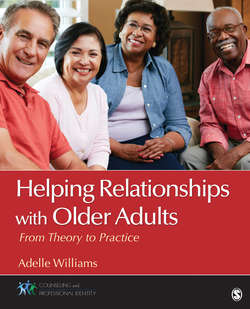Читать книгу Helping Relationships With Older Adults - Adelle M. Williams - Страница 8
На сайте Литреса книга снята с продажи.
Series Editors’ Preface
ОглавлениеIn 2014, the Census Bureau noted that the number of Americans aged 65 and older was expected to nearly double by the middle of the century, when they will make up more than a fifth of the nation’s population. This same report projected that by 2050, 83.7 million American will be 65 or older, which is noteworthy given the 43.1 million cited in 2012. The stresses and life challenges confronting those 65 and older, while reflecting those experienced by all adults, are oftentimes quite unique to this population. And, just as the challenges are unique, so too must be the services provided in support of these individuals as they continue to journey through life.
The specific knowledge, skills, and professional disposition required of those serving the psychological and emotional needs of an aging population are brilliantly articulated in Fundamentals of Helping Relationships With Older Adults: From Theory to Practice written by Dr. Adelle M. Williams. In this text, Dr. Williams employs her extensive expertise and clinical experience in working with the older adults to provide counselors-in-training with a guide to adult normative development as well as ways of recognizing and responding to that which is non-normative.
The material found in Fundamentals of Helping Relationships With Older Adults: From Theory to Practice reflects the latest research findings on issues of older adult development, as well as the best practice employed by those serving that population. In this text, readers will not only be provided an overview to the aging process, both as a gift and a challenge, but also will be guided in their development of those competencies essential to providing ethical, best-practice counseling to this older population. Fundamentals of Helping Relationships With Older Adults: From Theory to Practice provides the reader with insight into assessing, diagnosing, and treatment planning, including both general interventions and specialized counseling interventions, that constitute best practice for those working with today’s older adults. The text, with its extensive use of case illustrations, is designed to not only develop the reader’s understanding of the older adult experience, but also to develop those competencies necessary for professionally engaging with the older adult client. Unique to Dr. Williams’s approach is that she not only focuses on the reader’s development of essential knowledge and skill, but also on the dispositions and attitudes essential to the effective delivery of counseling service to older adults.
As is obvious, one text, one learning experience will not be sufficient for mastery of the processes of case conceptualization, or for the successful formation of your professional identity and practice. The formation of both your professional identity and practice will be a lifelong process, a process that we hope to facilitate through the presentation of this text and the creation of our series: Counseling and Professional Identity in the 21st Century.
Counseling and Professional Identity in the 21st Century is a new, fresh, pedagogically sound series of texts targeting counselors in training. This series is not simply a compilation of isolated books matching those already in the market. Rather, each book, with its targeted knowledge and skills, will be presented as but a part of a larger whole. The focus and content of each text serves as a single lens through which a counselor can view his or her clients, engage in his or her practice, and articulate his or her own professional identity.
Counseling and Professional Identity in the 21st Century is unique not because it “packaged” a series of traditional text, but because it provides an integrated curriculum targeting the formation of the readers’ professional identity and efficient, ethical practice. Each book within the series is structured to facilitate the ongoing professional formation of the reader. The materials found within each text are organized in order to move the reader to higher levels of cognitive, affective, and psychomotor functioning, resulting in readers’ assimilation of the materials presented into both their professional identity and approach to professional practice. While each text targets a specific set of core competencies (cognates and skills) essential to the practice of counseling, each book in the series emphasizes each of the following:
1 The assimilation of concepts and constructs provided across the text found within the series, thus fostering the reader’s ongoing development as a competent professional
2 The blending of contemporary theory with current research and empirical support
3 A focus on the development of procedural knowledge with each text employing case illustrations and guided practice exercises to facilitate the reader’s ability to translate the theory and research discussed into professional decision making and application
4 The emphasis on the need for and means of demonstrating accountability
5 The fostering of the reader’s professional identity and with it the assimilation of the ethics and standards of practice guiding the counseling profession.
We are proud to have served as coeditors of this series; feeling sure that text, just like Fundamentals of Helping Relationships With Older Adults: From Theory to Practice, will serve as a significant resource to you and your development as a professional counselor.
Richard Parsons, PhD
Naijian Zhang, PhD
